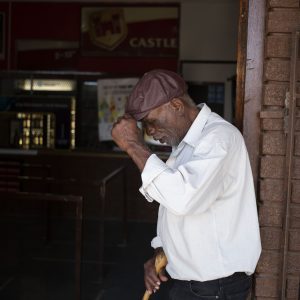Mzimasi Mnguni, a genius of South African boxing
The trainer, promoter and manager produced many world champions in a sport he got into ‘by accident’. Those who knew him tell of his passion and the role he played in the anti-apartheid movement.…
Author:
19 February 2021

“Many people don’t know that boxing was the last thing on Bro Mzi’s mind until he settled in East London [in 1977] after spending more than 10 years working in Johannesburg [as a messenger at the post office],” says Sihle Mnguni, the younger brother of the late Mzimasi “Bro Mzi” Mnguni.
Bro Mzi, who died on 13 February at the age of 73 after spending years recovering from a stroke in 2014, was one of the most influential figures in South African boxing – respected by boxers, trainers, administrators and fans. That the renowned trainer, promoter and manager got into the sport “by accident” makes his achievement and impact on boxing all the more remarkable.
“He grew up in Alice,” says Sihle, in MaZotshweni village in the Eastern Cape. “And as a young boy he was into stick-fighting and hunting. That was what boys his age and those older than him got involved in at the time. By the way, Bro Mzi was a very good hunter. He loved football and attended many [Moroka] Swallows matches while working in Johannesburg.”
Mnguni loved the Dube Birds until the end. He was wearing their maroon and white colours when he died, a reflection of how passionately he loved the things close to his heart. His passion and loyalty were evident throughout his boxing career, which started fittingly in the mecca of South African boxing, the township of Mdantsane. Mnguni’s career started around the era of iconic former South African junior lightweight champion Nkosana “Happyboy” Mgxaji, who was the darling of boxing fans throughout the country.
The boxing bug bites
Former Boxing South Africa (BSA) director of operations and acting chief executive officer Loyiso Mtya introduced Mnguni to the sport. “Mzi was strictly a soccer fan before the boxing bug bit him. He never boxed nor visited any boxing gym until he came to boxing-mad East London and opened a shop in NU 10,” said Mtya.
“Unknown to him, the area was teeming with boxing talent as well as youngsters who had little else to do with their lives. Nearby was a well-known and busy gymnasium owned by Boyce Zitumane, the biggest promoter at the time. No sooner had Mzi settled into running his business and started to enjoy his new life as a boxing fan than there was a knock on the door and a visit that would change his life forever.
“A group of boys led by former South African junior flyweight champion Mveleli Luzipho approached him and requested that he take them under his wings and manage their careers after their relationship with their mentor Boyce had ended,” said Mtya.
Mnguni knew nothing about boxing, but that didn’t discourage him from trying his hand at it to help the boys. His initial aim was to get them off the streets and create another opportunity for them. Little did he know that he would do more than that, including produce a number of world champions.
His first involvement in boxing was with Luzipho, who had just been offered a rematch and a chance to reclaim his title from the late Jacob Matlala, who had beaten him a few months earlier. It was the proverbial baptism of fire for Mnguni, who had to usher Luzipho into war despite having zero expertise as a boxing trainer. As his boxing knowledge was limited at the time, Mnguni solicited assistance from Mtya, who obliged.
Related article:
“He had to get the boy ready for such a mammoth task. He approached me to assist in training Luzipho. I already had my own stable, full of champions, at the time. I agreed to make time to train Luzipho, who went on to beat Matlala at the Orlando Stadium and regained his South African title. Mzi had arrived. He took the new challenge with a mixture of natural gift, determination and street wisdom,” Mtya said.
There was clearly no stopping Mnguni, as he continued to churn out provincial and national champions until he guided Welcome Ncita to a world title fight in 1990. After working extremely hard to make sure Ncita was ready to face Frenchman Fabrice Benichou in an International Boxing Federation (IBF) junior featherweight title contest in Tel Aviv, Israel, Mnguni was forced to return to South Africa two days before the fight. He had received a call from his Mdantsane home to tell him his shop had been burnt down during riots in the former Ciskei homeland.
“Bro Mzi sat down with me and told me everything about what had happened back home. I assured him that everything was okay and I promised him that I was going to win the fight. I delivered as per the promise I made to him,” Ncita said. “Bro Mzi has rested now after being sick for years. It’s very sad whenever someone close to you passes away. Bro Mzi was like a father to me and I will never forget his massive contribution to boxing.”
IBF success
Four years after Ncita won the IBF belt, Mnguni produced his second world champion when an unheralded Vuyani Bungu defeated a then unbeaten Olympic gold medallist Kennedy McKinney from the United States. This was a sweet victory for Mnguni as McKinney had dethroned Ncita two years earlier.
Bungu grew in stature and went on to defend the IBF junior featherweight title a record 13 times. Initially, Golden Gloves boss Rodney Berman was against the idea of the Mdantsane-born former world champion fighting McKinney, but Mnguni’s persuasive skills softened Berman.
“Mzi literally begged me to give Bungu a chance. I was reluctant because McKinney was a very good boxer and I had thought Bungu was not ready at the time. But Mzi assured me that Bungu was ready for the fight. Bungu surprised me on the night of the fight as he beat McKinney,” Berman said.
“Mzi was a genius, who kept producing champions from spartan training conditions. He used classrooms in Mdantsane to prepare his boxers to fight against opponents, who trained in state-of-the-art gymnasiums. We have lost a man who worked very hard for the sport he loved.”
Related article:
The taste of success got sweeter and sweeter as Mnguni produced yet another world champion in 1995. His boxer, Mbulelo Botile, defeated Harold Mestre to win the IBF bantamweight title. Later, Mnguni led Botile to IBF and International Boxing Organisation (IBO) featherweight glory.
The IBF was proving to be Mnguni’s happy hunting ground. He led Zolani Petelo to victory over Anucha Phothong in an IBF minimumweight title fight in 1997. Mnguni’s winning streak didn’t end there as he added South African and more world titles to his Eyethu Boxing Gym in Mdantsane.
“It was a very sad day for me when I got a call telling me about Bro Mzi’s death. Jola [Mnguni’s clan name] did a lot of things for me and it’s gonna be very difficult to forget his big role in my life. Our boxing suffered a lot when he got sick. You can just imagine how our boxing is gonna be like now that he is gone,” Bungu said.
Underground network supporter
Former BSA board member Andile Sidinile, who was close to Mnguni despite the deceased being more than 20 years older, has fond memories of Bro Mzi. “He liked to go it alone, but would ask for assistance in areas he was lacking expertise. Such a loner and a secretive man when he was working. Very few people know that he took part in the struggle against apartheid. He gave resources to the underground network during the days of the struggle.
“He accommodated operatives in secret houses in Mdantsane. He hired cars, which were used in operations aimed at fighting the apartheid regime. Progressive youth formations benefitted immensely from his monetary support,” said Sidinile.
“Amazingly, he was not so keen to support the sports boycott called by the Congress Movement he so supported as a person. He had enemies because he was steadfast in his commitment of sending his boxers overseas for fights. When the wave of sports transformation reached boxing, he was seen as the one who blocked it. He led the formation of the Border Boxing Movement together with Loyiso Mtya. They campaigned against the National Sports Council-aligned South African National Boxing Coordinating Council. He saw fighting internationally as a means for financial gain for his fighters. He didn’t believe that sports sanctions would yield any positive results in the transformation of the sport.”
Mnguni’s major contribution to boxing didn’t go unnoticed. Former minister of sport Fikile Mbalula honoured Mnguni with a Steve Tshwete Lifetime Achievement Award at the South African Sport Awards in 2016. Mnguni was also a Lifetime Achievement Award recipient at the 2017 South African Boxing Awards held in Port Elizabeth.
Sadly, his boxing activities came to a near halt after he had a stroke. Mnguni was on his way to watch IBF flyweight champion Moruti “Babyface” Mthalane face Filipino boxer Jether Oliva in an IBO flyweight title fight in Durban in 2014 when he fell ill on his way to the East London Airport.
Related article:
Sidinile, who was driving him and matchmaker Luyanda Kana, advised Mnguni to return home and forget about flying to Durban. “Mr Sidinile advised him against continuing with the trip to Durban and I agreed with him because I also noticed that he was really not well. Bro Mzi insisted that he was going to Durban to watch the sport he loved,”Kana said.
“On arrival there, when people were collecting their luggage, Bro Mzi fell on the floor and people including me were so shocked. He was attacked by a stroke. I called the airport staff for assistance. I was surprised when we arrived at the hotel as he came out of the car and walked without assistance from anyone. I called the late Thulani Magudulela, who came and advised us to take Bro Mzi to hospital, where he was admitted. He was discharged a few days later.”
The South African government has declared a provincial category two special official funeral for the boxing idol. Mnguni is to be laid to rest in MaZotshweni village on Sunday 20 February following two funeral services, in East London on Saturday and Alice on Sunday.
“We are going to have the first funeral service in East London on Saturday. We will then have another funeral service in Alice on Sunday and Bro Mzi will thereafter be buried in MaZotshweni. Our family decided on two funeral services to accommodate both East London and Alice communities,” said Sihle.



